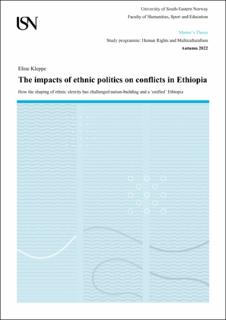The impacts of ethnic politics on conflicts in Ethiopia: How the shaping of ethnic identity has challenged nation-building and a ‘unified’ Ethiopia
Master thesis
Permanent lenke
https://hdl.handle.net/11250/3040771Utgivelsesdato
2022Metadata
Vis full innførselSamlinger
Sammendrag
Although wars between states have decreased, today's conflict picture is characterized by increased civil wars. Civil wars are often rooted in the role of identity and often ethnicity. In this thesis, Ethiopia will illustrate the tremendous global problem of interethnic violence and conflict.
Ethnic violence and war in Ethiopia have dominated the last decade. In 1991, ethnic federalism was established to solve the political and ethnic unrest and give minority rights to self-determination up to secession.
Studies of ethnicity in Ethiopia often lack historical anchoring. Its historical development must also be understood to understand the growing role of ethnicity and why such a controlling solution for power-sharing was established. Therefore, it is a historical review of the most important eras, further divided into the imperial, socialist, military, and federal eras.
Ethiopia’s history is both politicized and ethnicized in its complex history of nationalism, conflicts, civil wars, and political tensions. after a history of oppression and assimilation. By dividing the country along ethnic lines, Ethiopia has gone further than any other country by politicizing ethnicity. Today, there is a two-year ongoing civil war connected to crimes against humanity and cleansing in the Tigray region. This thesis explores ethnonationalism's role and connection to ethnic identity in Ethiopia's armed conflict and civil war. Further, the assignment seeks to understand how ethnic federalism challenged nation-building processes and a ‘unified’ country.
